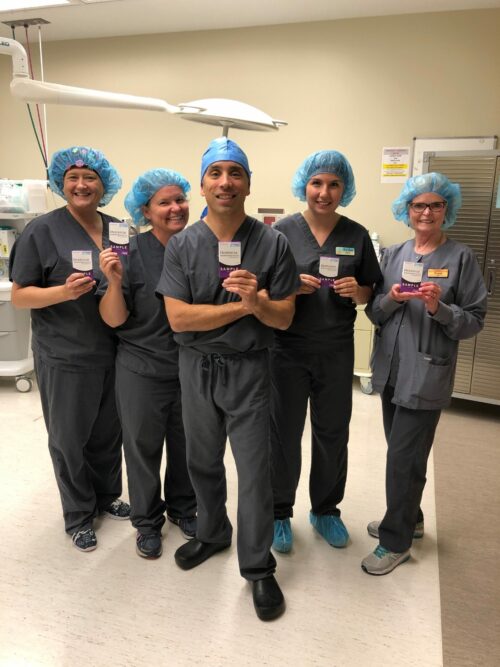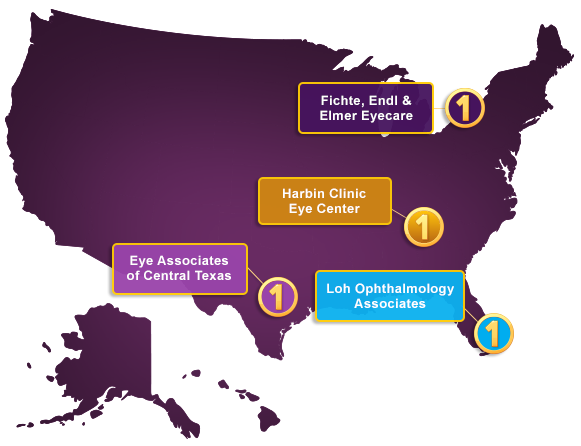
Have you been putting off Cataract surgery because you don’t like eye drops? Dextenza is a revolutionary new option to treat post-surgical symptoms and reduce the number of eye drops needed following cataract surgery. Dextenza is a corticosteroid that provides extended time-release of steroids into the eye, developed by Ocular Therapeutix.
Commonly used for post-cataract surgery care, the Dextenza insert can simplify post-surgical treatment regimens by eliminating the need for patients to remember to apply steroid eye drops.
Keep reading to learn more about Dextenza and how it can help with eye pain after ophthalmic surgery!
What is Dextenza?
Dextenza is an FDA approved ophthalmic insert. It was recently approved for treating inflammation and pain after eye surgery by the Centers for Medicaid and Medicare services.
It’s the first and only ophthalmic steroid insert. It releases a small dose of dexamethasone for a maximum of 30 days once inserted.
Fichte, Endl, and Elmer Eyecare are among the first eye practices offering this revolutionary new treatment option for ocular pain and inflammation.
Where does Dextenza go?
Dextenza is inserted into the punctum, which is a natural opening in the eyelid, and into the canaliculus.
There is no need to remove Dextenza following the treatment period – after the 30 days, it is absorbed by the body and exits via the nasolacrimal system.
How does Dextenza work?
Dextenza delivers dexamethasone to the eye’s surface for, at most, 30 days. It does this without the use of preservatives.
Dextenza activates with moisture and swells to fit comfortably and securely in the canaliculus.
Can anyone use Dextenza?
Most patients can use Dextenza. This may not be the case if you have certain eye conditions. These conditions include active corneal, conjunctival, or canalicular infections.
This includes diagnoses like epithelial herpes simplex keratitis (dendritic keratitis), vaccinia, varicella; mycobacterial infections; fungal diseases of the eye, and dacryocystitis. If you have these conditions it may be contraindicated.
What else do I need to know about Dextenza?
Dextenza is only meant to be used as a short term solution. If you need a long term solution, corticosteroids like Dextenza may not be the best option.
Long term use of these can lead to the development of glaucoma. Glaucoma occurs when the optic nerve gets damaged and eye pressure levels become elevated.
Glaucoma often has no symptoms until vision loss has already occurred, which is why regular eye exams are important.
Early diagnosis of glaucoma is the only way to preserve vision and to avoid further vision loss. If you have been diagnosed with glaucoma, use steroids with caution. Your eye doctor should monitor your intraocular pressure while using steroids.
Using a corticosteroid can hide other conditions. It can also increase your risk of developing a second condition. If you develop a condition with puss, steroids can hide an infection or make existing conditions worse.
If you use an ocular steroid, it can make viral eye infections last for longer periods of time or make them worse. An example of this would be herpes simplex.
For patients with persistent corneal ulceration and the current or past use of steroids, you need to consider a fungus developing. Your doctor should take a fungus culture when it is applicable.
Your eye doctor will be able to determine what contraindications to consider when prescribing Dextenza.
Dextenza at Fichte, Endl, & Elmer Eyecare
Are you experiencing symptoms after having ophthalmic surgery? Talking with your doctor is the best way to find out what your options are. You can mention that you have heard about Dextenza and are interested in seeing if it is a good fit.
Our practice is one of the pioneering groups introducing Dextenza into their post-operative care routines. We were involved in the preliminary studies of Dextenza and are now pleased to offer this as an option for our patients now that it has been FDA-approved.

Schedule an appointment at Fichte, Endl & Elmer Eyecare in Niagara Falls, NY to find out if Dextenza could be right for post-surgical care!


